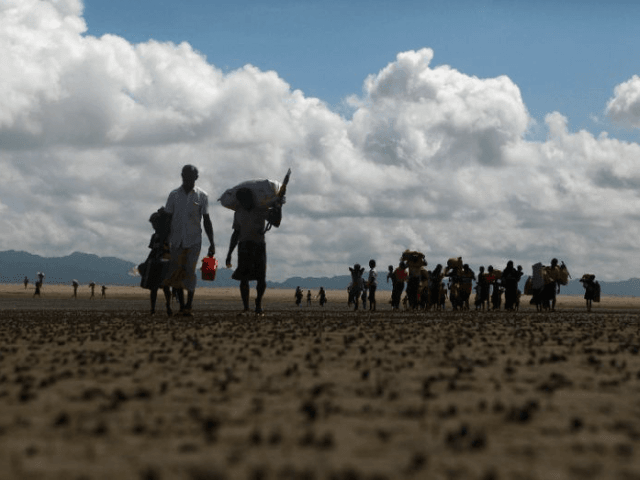The Rohingya crisis in Myanmar, which has seen a large population of Muslims displaced by security forces and vigilantes of the Buddhist-majority country, has drawn increasing worldwide attention.
It was even characterized as “ethnic cleansing” by the U.N. High Commissioner for Human Rights. The situation has attracted the attention of Muslims across the region and around the world, including terrorist gangs like al-Qaeda looking to exploit the anxieties of restless Muslim minorities in other countries.
However, the Rohingya received very little sympathy from Grand Mufti Ahmad Badreddin Hassoun of Syria, who said during an interview with Indian media that Rohingya refugees are a security threat to host countries such as India, while the government of Myanmar has been targeted by a propaganda campaign.
“I sincerely wish the Indian government to open a dialogue with the government of Myanmar. There is a big propaganda [effort] against the government of Myanmar and the story is not as clear as what has been reported in the media,” said Hassoun.
“These ‘450,000 refugees’ is repeated at least 100 times in one day, while Saudi Arabia has cost Yemen nine million refugees and there is no mention about this,” he added.
He accused the media of making “a very big issue of the Myanmar problem to get the attention of the Muslim world.”
“We need to study the problem in Myanmar … is it a religious problem? Or is it a security issue? Religion is being used as a scapegoat for a reason,” Hassoun contended.
The Rohingya, it should be noted, practice a form of Sunni Islam, while the Syrian ruling class belongs to the Alawite sect of Shia Islam. Hassoun has described himself as “Sunni in practice, Shiite in allegiance.” From a strategic standpoint, the extremist groups currently trying to use the Rohingya crisis as a recruiting tool have been among the groups fighting against Assad’s government in the long and bloody Syrian civil war.
In the course of transcribing Hassoun’s interview, the UK Independent notes that he knows a few things about disposing of unwanted people, having been directly involved in the execution of some 13,000 political prisoners at the horrifying Saydnaya prison complex. Syria, of course, is one of the world’s leading producers of refugees, with almost a quarter of the country’s population now living outside its borders. No ally of the regime in Damascus is likely to be mistaken for a humanitarian anytime soon.
Bangladesh has absorbed most of the Rohingya refugees so far, but a substantial number of them went to India, whose government regards them as illegal immigrants rather than refugees. The Indian Supreme Court is currently hearing a case challenging the deportation of about 40,000 Rohingya, some of whom have been in India since long before the current mass exodus began, triggered by government response to attacks from Rohingya militants last October.
The Indian government cited “material indicating linkages of some of the unauthorized Rohingya immigrants with Pakistan based terror organizations” and argued that the Rohingya “figure in the suspected sinister designs of ISIS and other extremist groups” in its affidavit to the Supreme Court. No evidence for these linkages has yet been released to the public, although the government promised to provide it to the Supreme Court under seal.
India also notes that it is not a signatory to the U.N. Convention Relating to the Status of Refugees, although critics of the deportation orders say the government still has a “moral obligation” to refrain from sending the Rohingya back to Myanmar to face further violence.
The government of Myanmar has given assurances that the Rohingya can return home, provided they have been properly verified as refugees, and is reportedly working on a repatriation plan with Bangladesh.
Rohingya living in Bangladesh appear to be generally skeptical of the offer, and sources in Bangladesh say hammering out the details of the repatriation agreement has been slow going, in part because Myanmar seems determined to minimize the number of “verified” refugees it will accept. In particular, Myanmar is reluctant to guarantee return for any of the 400,000 Rohingya who moved to Bangladesh before October 2016. Myanmar tends to regard the Rohingya as stateless at best, or foreign interlopers who properly belong in Bangladesh at worst.
An editorial in the Times of India on Tuesday described an “unlikely, and yet natural, alliance between Islamists, communists, and pseudo-liberals” coming together to oppose deportation for the Rohingya.
While acknowledging that deportation would be difficult to conduct from a practical standpoint given the large number of people involved, the editorial asserted “it is the right of every country to deport illegal immigrants,” and castigated other countries for their hypocrisy in criticizing India while maintaining their own deportation programs.
The editorial cited “organic links between the Rohingya and jihadist terror groups in Pakistan that go back a few decades” to argue the refugee community is a significant security threat, especially since India and Myanmar lack the resources to properly vet them.
“Many Rohingya were part of the ‘jihad’ against the erstwhile Soviet Union in Afghanistan and later participated in jihadist action in Kashmir,” the editorial notes, further accusing Rohingya refugees in Bangladesh of forming jihadist organizations. For the record, there is very little dispute that the Arakan Rohingya Salvation Army or ARSA is a violent insurgent organization that carried out attacks in Myanmar, but the Times of India goes further and suggests ARSA is a tool of the Pakistani intelligence service and jihadist groups.
“While there is no denying the humanitarian crisis caused by the disturbances in Myanmar, the solution to the crisis doesn’t lie in opening India’s doors to the Rohingya. The solution lies in creating conditions so that these people can go back to where they came from,” the editorial concludes.

COMMENTS
Please let us know if you're having issues with commenting.